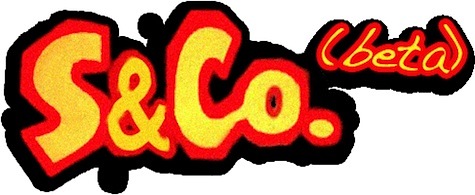With a mission to bring both new and out-of-print science fiction books together, Singularity & Co. is both an online bookstore and a real-life brick and mortar shop located in Brooklyn. We’re all about preserving science fiction both in and out of print, digital and physical. The shop is rapidly becoming one of the best resources for classic science fiction in the United States. Check out the website and the “Save the Sci-Fi” campaign here.
Here’s what we’re reading now!
From bookseller Jamil Moen:
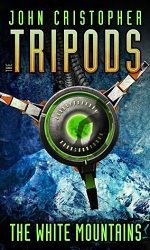 The Tripods Trilogy by John Christopher
The Tripods Trilogy by John Christopher
Someone came into the Singularity & Co. Bookshop recently having never read a science fiction or fantasy book. When I asked him what he preferred to read, he replied, “I usually read philosophy books.” My response to him was that the best works of these genres are philosophical at their core, adding or deleting a layer of experience to our engagement with the world within as well as beyond. With this in mind, I’ve taken a look back at a book that I read as a philosophy book first and science fiction second.
Before I knew what science fiction was—nevermind that I would be part of a digital publisher and bookshop at the end of the universe—I read the first novel in the series for an elementary school assignment and the ideas it generated haunted me. Set in the next century, John Christopher’s Tripods Trilogy, comprised of The White Mountains, The City of Gold and Lead and The Pool of Fire, finds its young protagonists mounting a resistance on the eve of an implantation ritual that ensures unquestioned loyalty to a race of machines that have conquered humanity. Its unsettling blend of futurism and pre-industrialism, shaped by forces both organic and inorganic, frames a simple, profound statement about freedom in all of its forms—from curiosity to self-definition—as fundamental to human subjectivity. Whether you want to start a young science fiction fan or feel young again, the trilogy is a fantastic look back on looking forward.
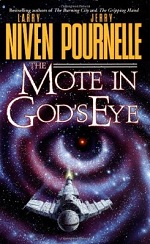 The Mote in God’s Eye by Larry Niven and Jerry Pournelle
The Mote in God’s Eye by Larry Niven and Jerry Pournelle
I first read The Mote in God’s Eye when I was about 11 or 12, but hadn’t read it since. I’d been afraid to read it again, worried that it wouldn’t stand up to memory, despite the fact that when asked about my favorite sci-fi books it has always been near the top of the list. When the exact 1970s edition that I’d read as a kid showed up on the shelves in our shop, however, I knew it was time.
Despite being nearly 40 years old, Mote is just as good today as I remember it being then. Niven and Pournelle had set out to write the ultimate first contact story, and by combining Niven’s talent for writing aliens who make us think more about us than we do about them with Pournelle’s excellently conceived and executed CoDominium universe, I’d venture to say they succeeded. Part Hornblower novel in space (with all the overtones of Star Trek that implies), part mystery, part world-building space opera, Mote is one of those books I can recommend without reservation. If you like books with planets and spaceships in them, you can’t not like this one.
From bookseller Cici James:
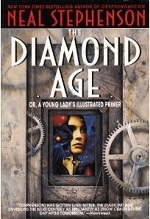 The Diamond Age by Neal Stephenson
The Diamond Age by Neal Stephenson
My first recommendation to anyone who asks is always Neal Stephenson’s The Diamond Age. Stephenson is deservedly well-known for the cyberpunk classic Snow Crash and the epic Cryptonomicon, but The Diamond Age is by far my favorite. It’s a gorgeous read that manages to be both a philosophical novel of ideas and a world-building, viscerally visual gem. And the ending is simply devastating. It’s the kind of book that has something for everyone, from the most seasoned science fiction aficionado to the simply curious genre first-timer.
The novel, which is considered “post-cyberpunk,” won both the Hugo and Locus awards for its depiction of a future world where molecular nanotechnology pervades everyday life. It is primarily the story of Nell, a girl born at disadvantage who receives a stolen, wondrous “book” (it contends with the Hitchhiker’s Guide), A Young Lady’s Illustrated Primer. As with Stephenson’s other work, quite some of the speculative technology he invented has come to pass, and we could easily see more if it emerge in our own time. The nature of artificial intelligence, a reality fast developing, is particularly explored; since this is a Stephenson book, we also get mediations on philosophy, religion, education, varied sciences, and the structures and chaos of society. We are left navel-gazing, wondering who we are and what will become of us.
From bookseller Kaila Hale-Stern:
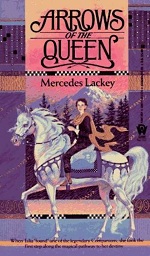 Arrows of the Queen by Mercedes Lackey
Arrows of the Queen by Mercedes Lackey
Mercedes Lackey’s popular, wide-ranging series of books set in her world of Valdemar may not be the stuff of high literature, but Lackey can always be counted on to tell an emotional, gripping tale. This is a nostalgic pick: Arrows of the Queen was the first fantasy I ever read, and I have given it to many. The story of Talia, a sensitive girl from a wretched home carried off by a talking horse to a school of mindmagic, the trope is not new, but Arrows of the Queen is a moving, humane coming-of-age genre novel that teens should consider reading instead of Twilight.
Talia has a lot on her plate: she’s been Chosen to be a Herald (a sort of super-powered, super-moral person who protects the kingdom), and has to learn to use her special abilities in a daunting world of court politics and magic-school politics, with a horrid brat of a princess in her charge and sinister forces at work to seize the crown. Lackey’s Heralds are on a side of good that I still find irresistible. The Chosen are essentially self-sacrificing, but the characters are richly drawn and diverse. Many appear in Talia’s trilogy and in books thereafter, and they will come to be old friends. Same-sex relationships, though not a focus of the narrative as in Lackey’s The Last Herald-Mage series, are treated with refreshing egalitarianism for a book published more than twenty-five years ago, and an overall message of acceptance is paramount.
Talia’s adventures grow darker as she ages, but Arrows of the Queen is both an excellent standalone for newcomers to fantasy and a great jumping-off point for forlorn Harry Potter people and fans of talking animals everywhere.
From bookseller Sara Livant:
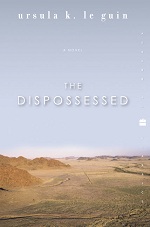 The Dispossessed by Ursula K. Le Guin
The Dispossessed by Ursula K. Le Guin
I picked this book up on a whim, so I was delighted to discover it contained so many things I like to read. I loved The Dispossessed initially because I am a constructed language geek and Pravic, the language of the planet Annares, is engineered to enforce an anarchic mindset for everyone who speaks it by, for example, discouraging the possessive case, and using gender-neutral pronouns and verbs. As I gleefully absorbed the bits and pieces of Pravic and Iotic (the language of Urras), I began to realize a beautiful story of love and family was being carefully woven in the non-linear narrative.
This is also the story of one man’s struggle against a stagnating society and the toll his own genius takes on his mind and body. Once I finished the book, I looked it up and found out it’s set before Le Guin’s Hainish Cycle, but written and published afterward. The Dispossessed explains the technological basis for the ansible, a means of instantaneous communication used in the Hainish Cycle. I was amazed to find such a complete and moving story created out of a desire to explain a prevalent technology used in a previously-written series. Don’t worry if you haven’t read the Hainish Cycle, however. The Dispossessed is fantastic all on its own.
From bookseller Michael Alexander
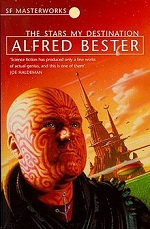 The Stars My Destination by Alfred Bester
The Stars My Destination by Alfred Bester
This book came out fifty years ago, needs zero explanation to a newcomer, and wires me just as much today as it did when I first read it in a single breathless sitting at the age of 14. Gully Foyle is an unmotivated loser who gets left to die on an asteroid, then proceeds on a quest to hunt down everyone on the rescue ship that passed him by. Unfortunately for him, mid-escape he gets tattooed with a horrific mask all over his face by degenerate scientist-worshippers. The tattoo-mask only shows up when he gets angry, so this game is ice cold.
Sure, the basic plot is a rip-off of the The Count of Monte Cristo, but Alexandre Dumas never wrote a carnivalesque tour of a world where learning to teleport is like getting your driver’s license, with warehouses in the Moon full of the cryogenically frozen, or with time travelers covered in fire who tear holes in the page with ee cummings-style onomatopoeia. It completely erased the line between pulp and literature, and even decades later it made my tween self yearn to be able to teleport to the mall. Give it to the Hulk fan still trapped inside yourself.
You can visit Singularity & Co. on their website or at their store in Brooklyn, NY. Follow them on Twitter or Facebook.










